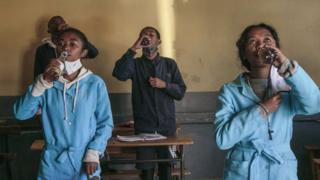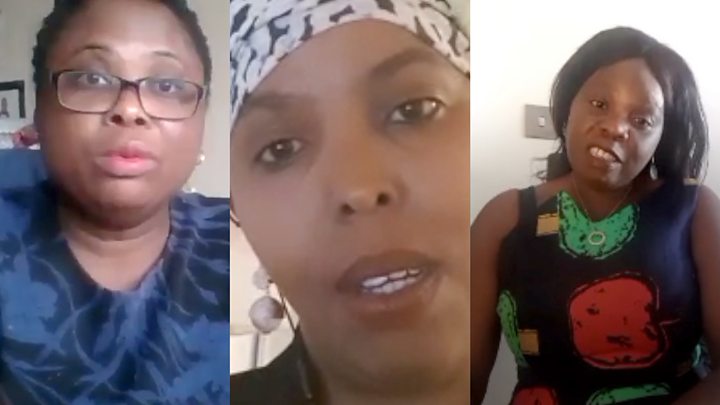 Image copyright AFP
Image copyright AFP The World Health Organization (WHO) has issued a warning against people using untested remedies for coronavirus.
Africans deserve access to medicines that have gone through proper trials even if they are derived from traditional treatments, it said.
Its statement comes as Madagascar’s president is promoting a herbal tonic for treating Covid-19 patients.
The African Union (AU) said it wanted to see the scientific data on the “safety and efficacy” of the product.
The tonic, known as Covid-Organics, was tested on fewer than 20 people over three weeks, a presidential aide told the BBC – which is not in line with WHO guidelines on clinical trials.
This can be a lengthy process in which a potential drug is tested in four phases, scaling up from a trial on a small number of patients to using it on a population countrywide.
Despite these reservations, several African countries, including Guinea-Bissau, Equatorial Guinea and Liberia, have already ordered Covid-Organics, which is produced from the artemisia plant – the source of an ingredient used in a malaria treatment – and other Malagasy plants.
Last week, Madagascar’s President, Andry Rajoelina, spoke to an online meeting of African leaders about the tonic.
Following that meeting the AU asked to see more details about Covid-Organics which could be reviewed by the Africa Centres for Disease Control and Prevention (Africa CDC).
It its statement, the WHO welcomed innovations based on traditional remedies and plants but said they “should be tested for efficacy and adverse side effects”.
“Africans deserve to use medicines tested to the same standards as people in the rest of the world,” it added.
On Monday, more than $8bn (£6.5bn) was pledged to help develop a coronavirus vaccine and fund research into the diagnosis and treatment of the disease.
Dozens of research projects trying to find a vaccine are currently under way across the world.
Most experts think it could take until mid-2021, about 12-18 months after the new virus first emerged, for a vaccine to become available.
You may also be interested in:

Media playback is unsupported on your device
Several African countries acted swiftly in trying to prevent the spread of coronavirus by imposing lockdowns or curfews. But these are now beginning to be lifted as governments try to balance health and economic interests.
The easing of the lockdowns has added urgency to the need to find treatments.
Madagascar has recorded 151 cases of Covid-19 and no deaths, Africa CDC says.
The president imposed a lockdown on the three major cities, but these have now been relaxed, the AFP news agency reports.
Click Here to Visit Orignal Source of Article https://www.bbc.co.uk/news/world-africa-52544187


